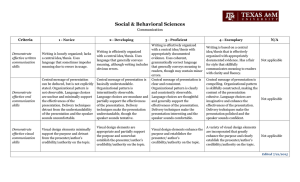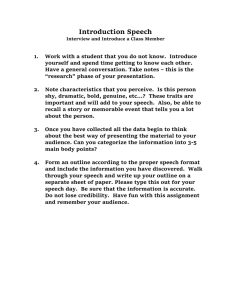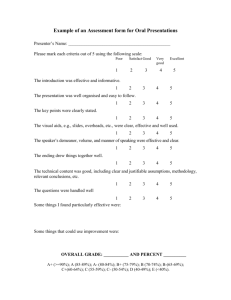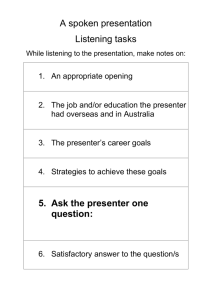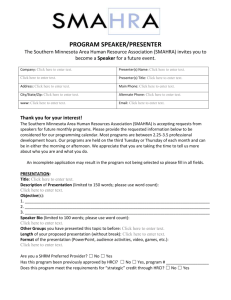Goal 1: To cultivate intellectual and practical skills that... across the curriculum, in the context of progressively more challenging...
advertisement
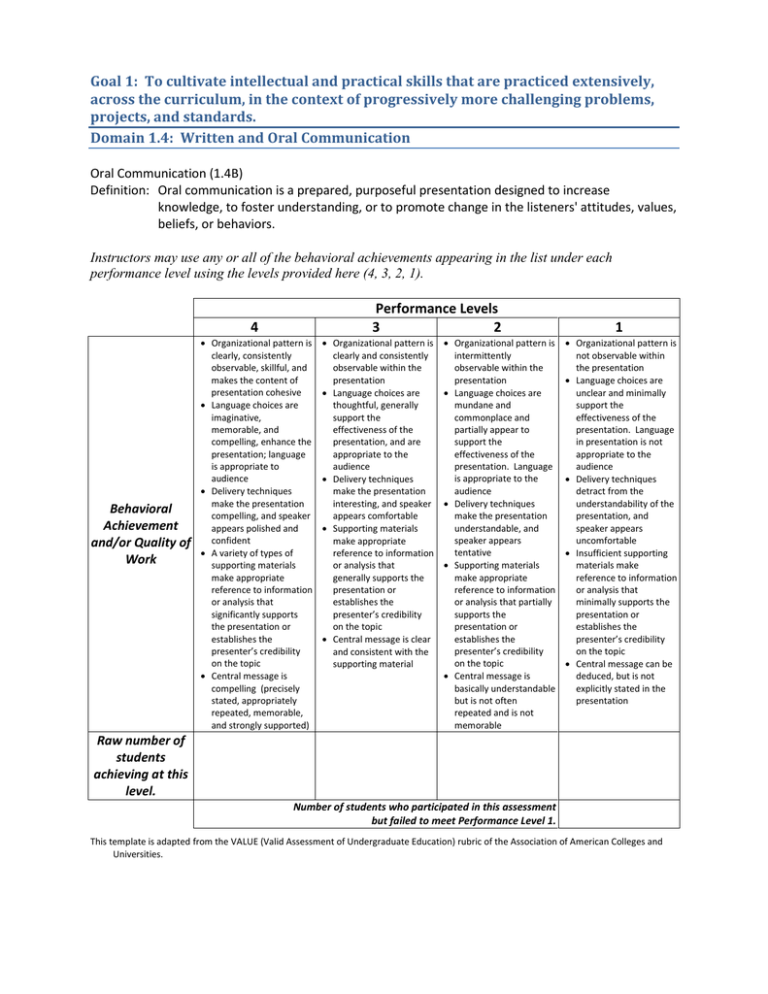
Goal 1: To cultivate intellectual and practical skills that are practiced extensively, across the curriculum, in the context of progressively more challenging problems, projects, and standards. Domain 1.4: Written and Oral Communication Oral Communication (1.4B) Definition: Oral communication is a prepared, purposeful presentation designed to increase knowledge, to foster understanding, or to promote change in the listeners' attitudes, values, beliefs, or behaviors. Instructors may use any or all of the behavioral achievements appearing in the list under each performance level using the levels provided here (4, 3, 2, 1). 4 Behavioral Achievement and/or Quality of Work Raw number of students achieving at this level. • Organizational pattern is clearly, consistently observable, skillful, and makes the content of presentation cohesive • Language choices are imaginative, memorable, and compelling, enhance the presentation; language is appropriate to audience • Delivery techniques make the presentation compelling, and speaker appears polished and confident • A variety of types of supporting materials make appropriate reference to information or analysis that significantly supports the presentation or establishes the presenter’s credibility on the topic • Central message is compelling (precisely stated, appropriately repeated, memorable, and strongly supported) Performance Levels 3 2 • Organizational pattern is clearly and consistently observable within the presentation • Language choices are thoughtful, generally support the effectiveness of the presentation, and are appropriate to the audience • Delivery techniques make the presentation interesting, and speaker appears comfortable • Supporting materials make appropriate reference to information or analysis that generally supports the presentation or establishes the presenter’s credibility on the topic • Central message is clear and consistent with the supporting material • Organizational pattern is intermittently observable within the presentation • Language choices are mundane and commonplace and partially appear to support the effectiveness of the presentation. Language is appropriate to the audience • Delivery techniques make the presentation understandable, and speaker appears tentative • Supporting materials make appropriate reference to information or analysis that partially supports the presentation or establishes the presenter’s credibility on the topic • Central message is basically understandable but is not often repeated and is not memorable 1 • Organizational pattern is not observable within the presentation • Language choices are unclear and minimally support the effectiveness of the presentation. Language in presentation is not appropriate to the audience • Delivery techniques detract from the understandability of the presentation, and speaker appears uncomfortable • Insufficient supporting materials make reference to information or analysis that minimally supports the presentation or establishes the presenter’s credibility on the topic • Central message can be deduced, but is not explicitly stated in the presentation Number of students who participated in this assessment but failed to meet Performance Level 1. This template is adapted from the VALUE (Valid Assessment of Undergraduate Education) rubric of the Association of American Colleges and Universities. Page 2 of Reporting Template Department/Program: Semester, Year of Assessment: Assessment Method: Course(s) Number (not section), student work product that was evaluated, brief description of the rubric or evaluation instrument used (a copy would be appreciated.) Executive Summary: Please briefly describe your findings, and your interpretations of the findings. Recommendations: Please provide any suggestions you have for improvement (e.g., from minor adjustments to the course, to changes to the assessment method, to major changes in KU’s approach to the learning goal)
